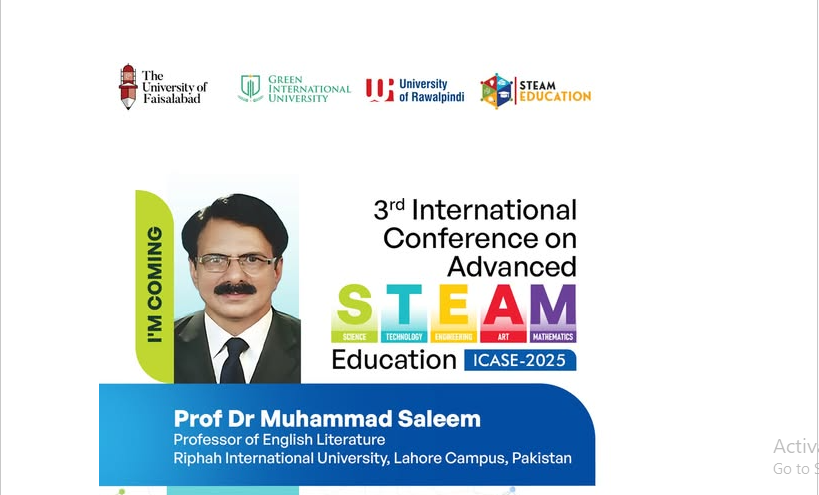Constructing Arguments, Presenting Claims & Developing Structure
The art of argumentation is central to academic discourse, shaping how ideas are presented, debated, and transformed across disciplines. At the STEAM Conference 2025, the session titled “Constructing Arguments, Presenting Claims & Developing Structure” brought together scholars of English Language and Literature to explore the evolving dynamics of rhetoric, critical theory, and narrative interpretation. The session was held in Room 001, Venue 4, under English Language and Literature 1.
The session was chaired by Prof. Dr. Muhammad Saleem (Riphah International University, Lahore Campus), who emphasized the importance of structured reasoning in academic writing and critical inquiry. Co-Chair Prof. Dr. Nailah Riaz (The University of Faisalabad) highlighted how modern theoretical frameworks—from posthumanism to digital aesthetics—continue to influence the ways arguments are constructed and interpreted in contemporary scholarship.
Enhancing Speaking English: Equity Ratio in Language Assessment
Sham Haider — KIMEP University, Almaty, Kazakhstan**
Opening the session, Sham Haider introduced an innovative perspective on equity in English language assessment, focusing specifically on speaking skills. His research addressed how traditional evaluation methods often disadvantage non-native speakers and argued for a more balanced equity ratio in assessment design. The talk emphasized fairness, inclusivity, and the need for adaptable frameworks that acknowledge linguistic diversity in academic and professional settings.
Posthumanism and Transhuman Culture in Accelerando
Prof. Dr. Nailah Riaz — The University of Faisalabad**
Prof. Dr. Nailah Riaz explored the emergence of posthuman and transhuman identities in Charles Stross’ Accelerando. Through a posthumanist lens, her study analyzed how technological evolution challenges conventional human boundaries, reshaping the idea of consciousness, agency, and selfhood. The work highlighted how speculative fiction serves as a space for reimagining the future of humanity.
Dismantling Meta-Narratives: A Postmodern Reading of The God of Small Things
Rakia Imtiaz — The University of Faisalabad**
Rakia Imtiaz delivered a compelling postmodern analysis of Arundhati Roy’s acclaimed novel, focusing on meta-narratives, fragmented histories, and power structures. Her research showed how the novel resists grand narratives, instead revealing the complexities and contradictions of marginalized voices. The presentation highlighted postmodernism’s ability to challenge dominant ideologies and reclaim suppressed stories.
Beyond Life and Time: Temporal Distortion and Metanarrative Subversion
Muhammad Aziz Raza — The University of Faisalabad**
Muhammad Aziz Raza examined temporal distortion as a narrative technique and its role in subverting metanarratives. His study traced how nonlinear timelines create alternative interpretations of reality, allowing literature to question universal truths. The analysis underscored the significance of narrative experimentation in reshaping reader perception.
Hyperreality and the AI Aesthetic in Black Mirror
Shehzad Ali — National University of Modern Languages, Islamabad**
Shehzad Ali presented a fascinating exploration of hyperreality, simulation, and the AI aesthetic in the hit anthology series Black Mirror. Using Baudrillard’s theoretical lens, he investigated how the show blurs boundaries between real and artificial worlds. The talk highlighted how digital culture produces new forms of hyperreality, questioning authenticity, identity, and human agency.
Profiling Through Language: Power Dynamics in Netflix’s Mindhunters
Rimal Fatima — The University of Faisalabad**
Rimal Fatima focused on language as a tool of power, drawing from critical discourse analysis to examine interrogation patterns in Mindhunters. She illustrated how linguistic strategies—such as leading questions, controlled silence, and lexical framing—shape criminal profiling and reinforce hierarchical power relations. Her work emphasized the intersection of language, psychology, and authority.
Language, Identity & Interpretation: Closing Reflection
Safa Ikram — The University of Faisalabad**
In the concluding presentation, Safa Ikram discussed the broader implications of language use in shaping identity and meaning, encouraging participants to rethink how narrative structures influence interpretation. Her talk situated argumentation within a wider socio-cultural context, connecting discourse strategies to power, representation, and ideology.
Conclusion
The session illuminated how argumentation is not merely a writing skill but a core intellectual practice that structures thought across literature, media, linguistics, and cultural theory. Guided by Prof. Dr. Muhammad Saleem and Prof. Dr. Nailah Riaz, the presentations showcased the depth and diversity of contemporary literary scholarship—from hyperreality to posthumanism and critical discourse analysis.
Together, these studies demonstrated how constructing strong arguments, presenting well-supported claims, and developing logical structure remain essential tools for navigating today’s rapidly evolving literary and cultural landscapes.

